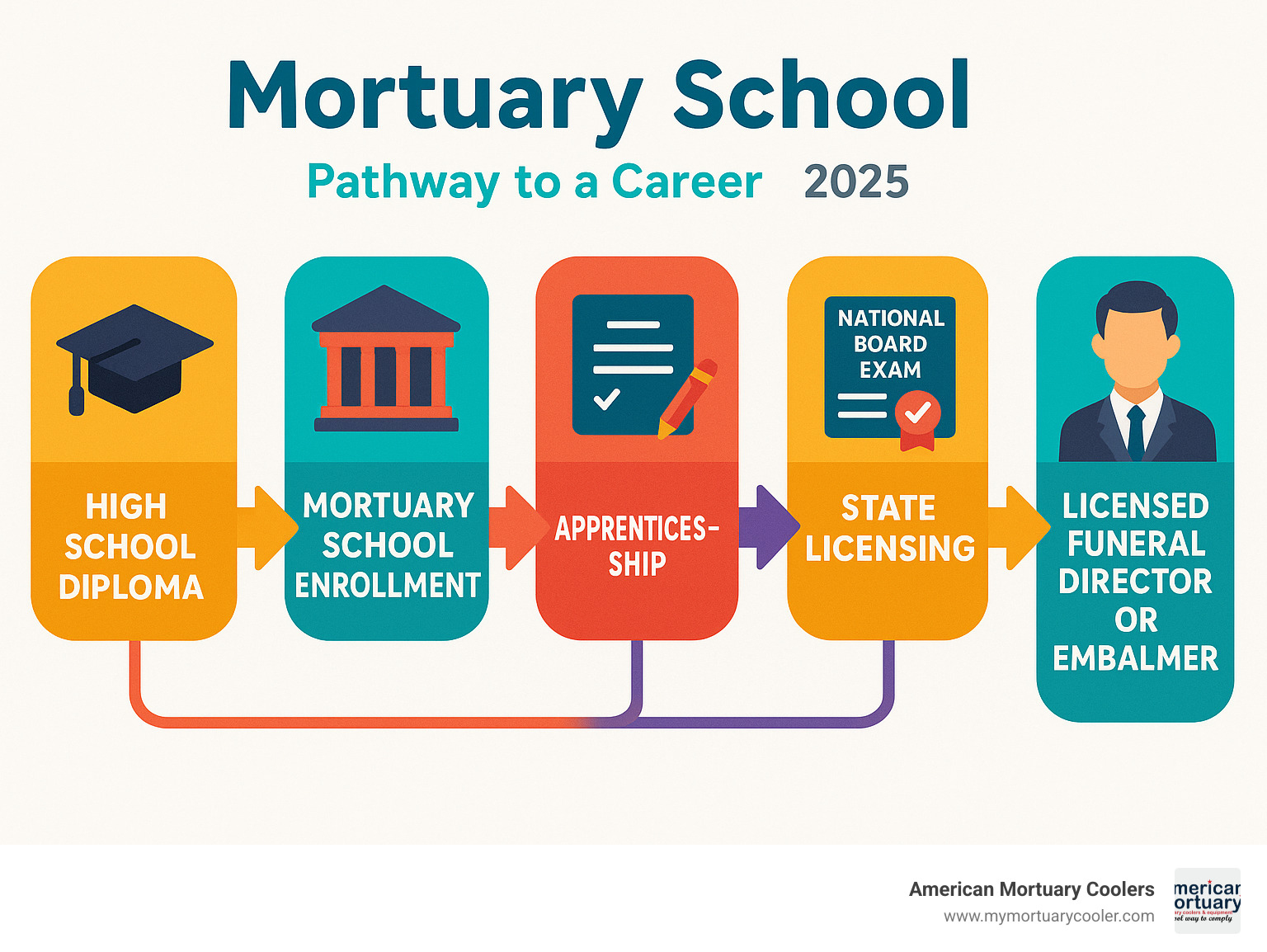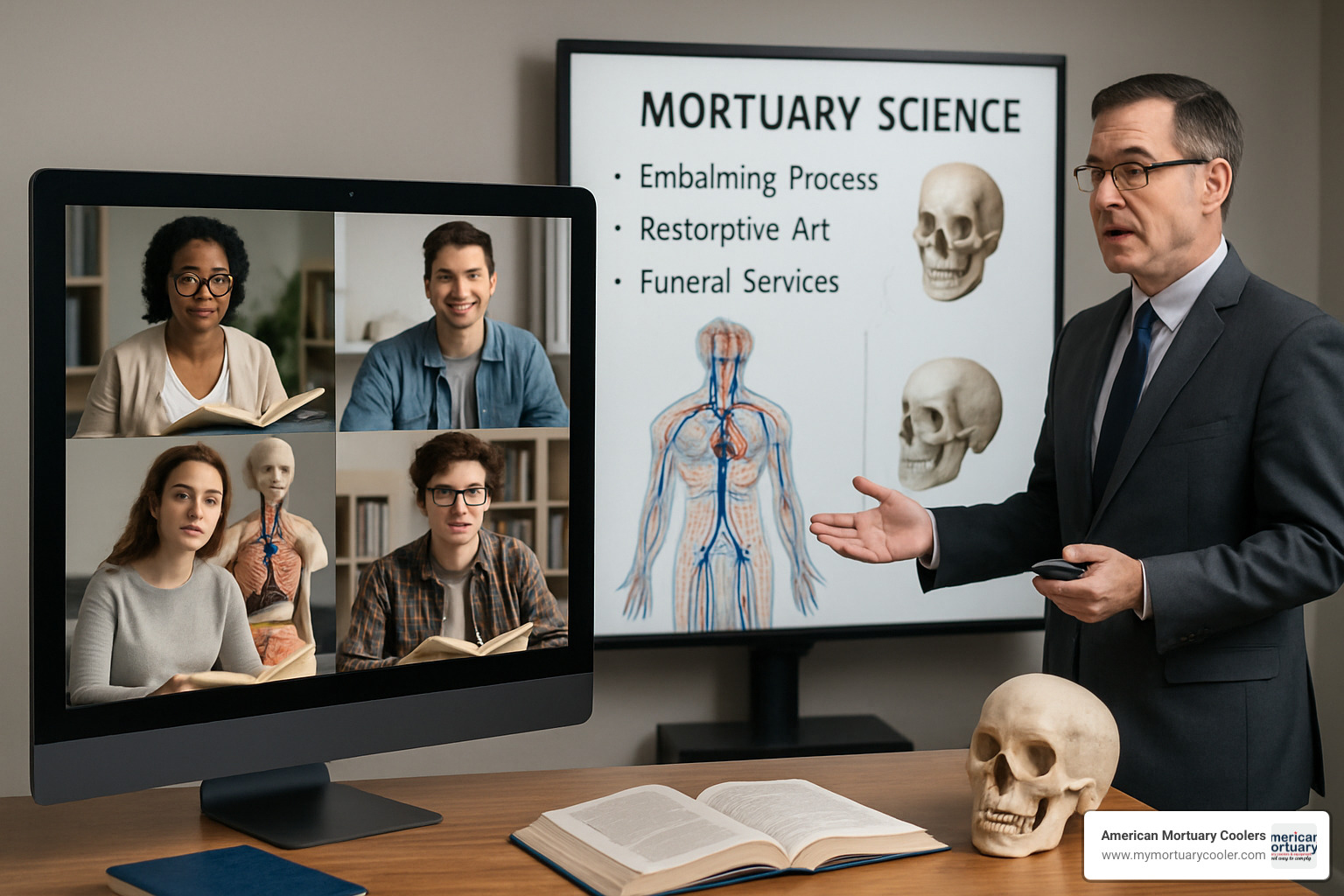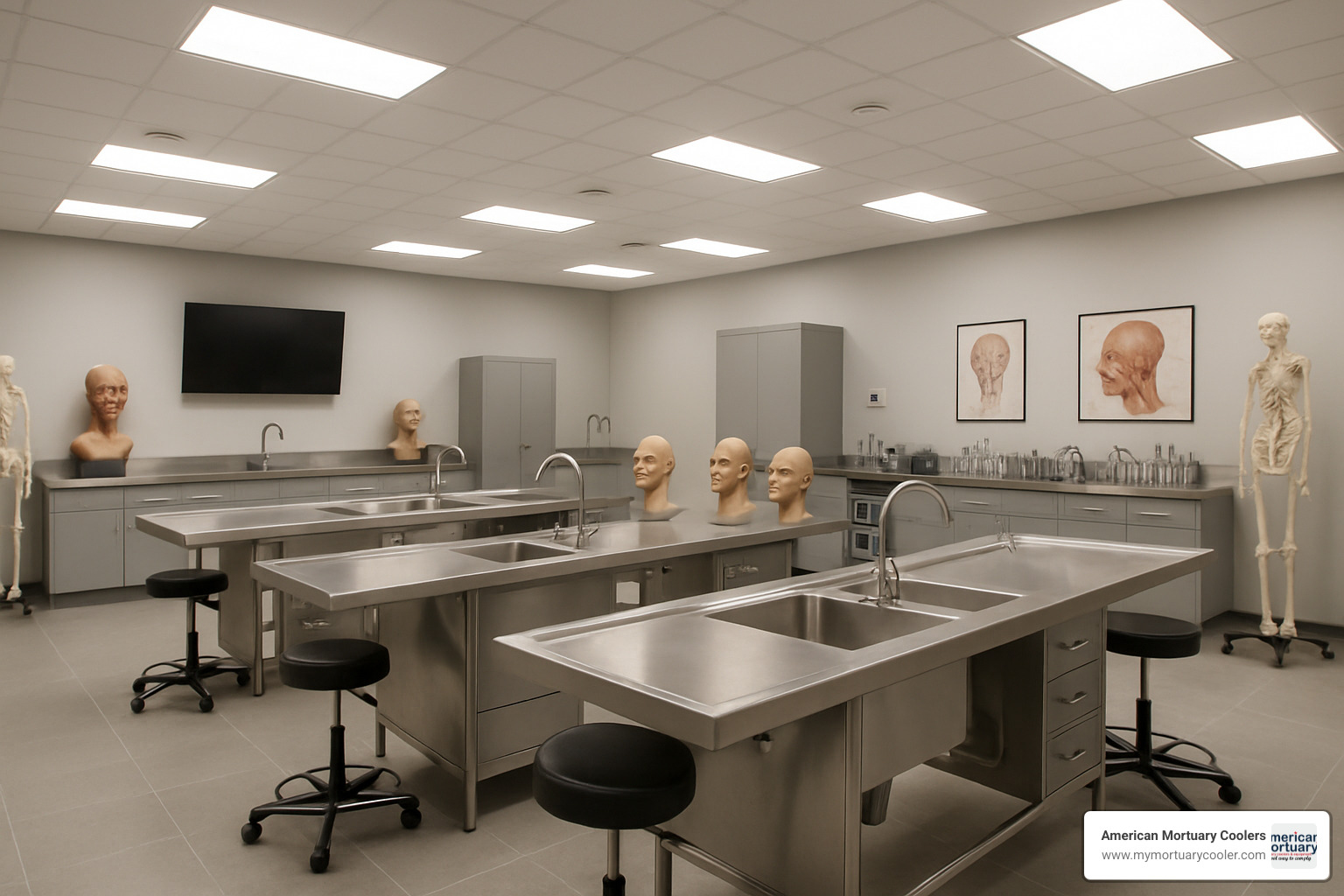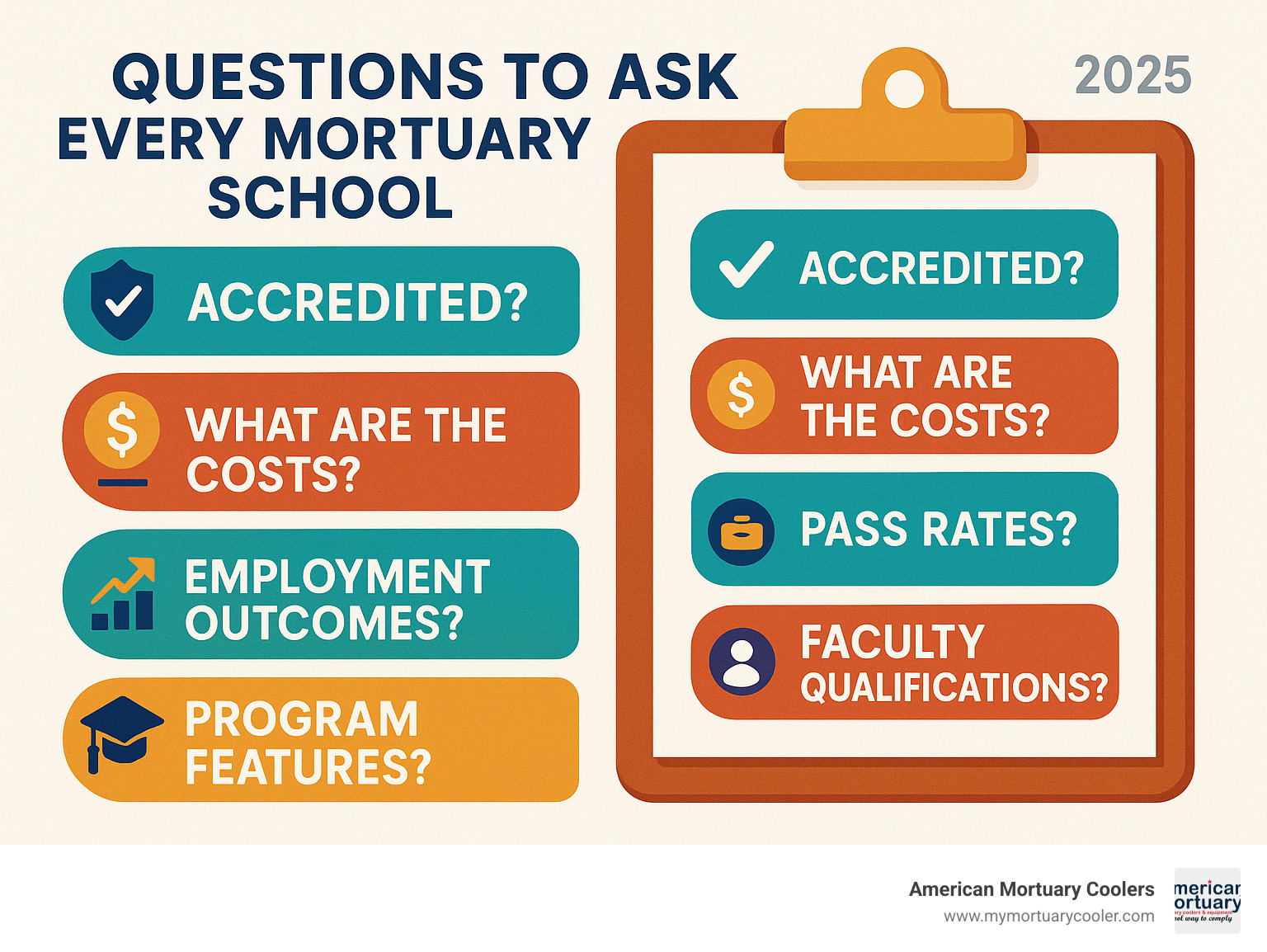Why Mortuary School Opens Doors to a Meaningful Career
Mortuary school prepares students for careers as funeral directors and embalmers - professionals who serve families during their most difficult times. Here's what you need to know:
Key Facts About Mortuary School:
- Duration: 15-24 months for most programs
- Cost: Average $23,753 for undergraduate programs
- Requirements: High school diploma, minimum 2.0-2.5 GPA
- Degrees: Associate degree (most common), bachelor's, or certificate
- Licensing: Must pass National Board Exam and state requirements
- Career Outlook: 12% job growth projected, $39,000-$76,000 salary range
- Accreditation: Look for ABFSE-accredited programs
The funeral service profession has changed dramatically in recent years. Over 70% of students entering mortuary science programs today are women - more than double the number of men. This shift reflects the profession's evolution from a male-dominated field to one that values compassion, communication skills, and emotional support.
Most states require an associate degree from an ABFSE-accredited program plus 1-3 years of apprenticeship before you can become licensed. Programs combine classroom learning in anatomy, chemistry, and business with hands-on embalming practice in funeral homes.
I'm Mortuary Cooler, and as a national-level mortuary cooler supplier, I've worked closely with funeral homes and mortuary school programs across the country to understand their equipment needs and training requirements.

Basic mortuary school glossary:
What Is a Mortuary School and Who Should Attend?
Mortuary school trains students to become funeral directors, embalmers, or both - professionals who step in during families' most vulnerable moments.
Funeral directors help families decide between cremation or burial, coordinate with cemeteries, select caskets and urns, prepare obituaries, file legal documents, and provide grief counseling and emotional support to bereaved families.
Embalmers focus on the technical side - body preparation, restorative art, and cosmetic application that allows families to say their final goodbyes with dignity.
Who thrives in this field? People with a "caregiving mindset." You'll need emotional resilience to handle difficult situations, excellent communication skills to guide families through tough decisions, and genuine empathy.
The financial picture is encouraging. Funeral professionals earn an average of $58,200 annually, with salaries ranging from $39,000 to $76,000. The field is projected to grow 12% over the next decade.
Over 70% of students entering mortuary science programs today are women - a complete flip from decades past when this was primarily male-dominated. This shift has brought fresh perspectives to grief counseling and family support services.
Mortuary School vs. Funeral Director College
"Mortuary school," "funeral director college," and "mortuary science program" all mean the same thing - ABFSE-accredited institutions that train you for funeral service careers.
A mortician is the modern term for someone who's both a funeral director and embalmer. A funeral director focuses on arrangement conferences and family counseling. An embalmer specializes in body preparation. Undertaker is an older term that's mostly fallen out of use.
Many states require dual licensure, meaning you need separate licenses to work as both a funeral director and embalmer.
Online Mortuary School Pros & Cons
Online mortuary school programs offer flexible scheduling and often lower tuition costs. You won't need to relocate and can access programs that might not be available in your area.
But embalming is hands-on work. You can't learn to prepare a body through a computer screen. Most online programs offer weekend intensive lab sessions on campus or partner with local funeral homes for practicum experience.
The reduced face-to-face interaction can feel isolating, and some employers still prefer graduates from traditional programs.
For more detailed information about getting started in this field, check out our Beginners Guide to Mortuary Science.
Comparing Mortuary Science Programs: Degrees, Formats, Costs

Most students choose an associate degree program, which requires 60 semester hours and typically takes 18-24 months to complete. This costs an average of $23,753 and meets licensing requirements in nearly all states.
Bachelor's degree programs take four years and include broader general education requirements. While more expensive, these programs often include business administration components that can give you an edge in management roles.
Certificate programs offer a focused 12-18 month path for career changers who already have college credits. However, these may not meet licensing requirements in all states.
Program lengths vary significantly. Dallas Institute offers a 15-month associate degree, while other schools take 18-24 months depending on the degree type.
Hybrid programs combine online theoretical instruction with in-person lab work, giving you flexibility while ensuring essential hands-on experience.
Accreditation & Quality Metrics
Your mortuary school must have ABFSE accreditation. Only graduates from ABFSE-accredited programs can sit for the National Board Examination in most states.
National Board Exam pass rates tell you about program quality. Cypress College boasts 88% passing the Arts section and 91% passing Sciences, compared to national averages of 78% and 69%. Some top programs report pass rates up to 97% versus the national average of 64%.
Employment rates matter just as much. Cypress College reports 90% of graduates find employment overall, with 84% working in funeral service. Worsham College achieves a 92% job placement rate.
The ABFSE directory provides comprehensive information about accredited programs, including detailed outcome statistics.
Budgeting for Mortuary School
That average cost of $23,753 represents just tuition. Budget for books and supplies ($1,000-$2,000), lab fees and equipment ($500-$1,500), licensing exam fees ($200-$500), and living expenses if studying full-time.
Federal Pell Grants through FAFSA provide need-based assistance. Work-study programs, veterans benefits, and professional association scholarships provide additional opportunities.
Many schools offer payment plans to make education more accessible.
For comprehensive guidance on planning and budgeting, check out our detailed Mortuary Science Education 101 guide.
Licensing, Apprenticeships & Career Outlook

Becoming a licensed funeral director or embalmer requires more than just graduating from mortuary school. Most states follow this pattern:
Typical Licensing Path:
- Graduate from ABFSE-accredited program
- Complete 1-3 years of apprenticeship under licensed supervision
- Pass the National Board Examination (NBE)
- Pass state board examinations
- Meet continuing education requirements
National Board Examination Details:
- Two sections: Arts and Sciences
- 170 scored multiple-choice questions per section
- Minimum passing score: 75
- Covers embalming, restorative art, funeral directing, and regulations
State Requirements Vary:
- Some states require separate licenses for funeral directing and embalming
- Age requirements typically range from 18-21
- Background checks and character references are common
The career outlook remains strong with 12% projected job growth, driven by an aging population.
Crafting Your Apprenticeship Plan
The apprenticeship phase translates classroom knowledge into real-world skills.
Finding Apprenticeship Opportunities:
- Contact funeral homes directly
- Use the National Funeral Directors Association (NFDA) job board
- Work with your school's placement office
- Network through professional associations
What to Expect:
- Supervised embalming procedures
- Arrangement conferences with families
- Funeral service coordination
- Business operations exposure
- Grief counseling practice
Making the Most of Your Apprenticeship:
- Ask questions and seek feedback actively
- Build relationships with experienced professionals
- Document your learning experiences
- Develop both technical and soft skills
For current employment trends, consult the Bureau of Labor Statistics occupational outlook.
Continuing Education After Mortuary School
Professional development continues after licensure:
Required Continuing Education:
- Most states mandate 10-20 hours annually
- Topics include legal updates, new techniques, and ethics
- Online courses are increasingly accepted
Specialized Certifications:
- Advanced grief counseling certificates
- Restorative art workshops
- Cremation operation training
- Management and business courses
Staying current through continuing education helps professionals adapt to industry changes while providing the best service to families.
For information about professional tools, read our Complete Guide to Mortician Tools.
How to Choose the Best Mortuary School for You

Choosing the right mortuary school requires careful evaluation of several key factors.
Your first priority should be ABFSE accreditation - without it, you won't be eligible for licensing in most states. Look for schools where National Board Exam pass rates exceed national averages. When Cypress College reports 88% pass rates compared to national averages of 78%, that indicates superior teaching quality.
Graduate employment rates matter equally. You want to see at least 80% of graduates finding work in funeral service within six months. Worsham College's 92% job placement rate reflects strong industry connections.
The learning environment shapes your experience. Modern lab facilities with proper equipment make a huge difference when learning embalming techniques. Schools completing 500+ embalming procedures annually provide better hands-on experience.
Faculty qualifications and student-to-instructor ratios directly impact education quality. Look for programs with ratios of 17:1 or better in lab courses.
Consider your learning style preferences. Some students thrive in traditional classroom settings, while others prefer hybrid program flexibility.
Location and cost create practical constraints. Living expenses vary dramatically between areas. Program length affects both tuition costs and how quickly you can start earning.
Financial aid availability can make or break your decision. Schools participating in federal aid programs or offering payment plans give you more options.
Questions to Ask Every Mortuary School

Smart questions separate great schools from mediocre ones. Schools confident in their quality welcome detailed inquiries.
Start with academic performance metrics. Ask for National Board Exam first-time pass rates for the last three years. How do these compare to national averages? What percentage of graduates find employment in funeral service within six months?
Dig into the hands-on learning experience. How many embalming cases do students complete? Where do students complete practicum requirements? Schools with strong funeral home partnerships provide better real-world training.
Financial transparency protects you from surprises. Get the total cost including all fees. What financial aid options are available? Do they offer payment plans?
Program structure details help you plan. How many hours of hands-on lab work are included? How do they assist with apprenticeship placement? What's their policy on make-up exams?
Student support services become crucial during challenging material. What academic support is available? How do they help students prepare for licensing exams? What career placement services do they offer?
The best mortuary schools provide detailed, confident answers and offer to connect you with current students and recent graduates.
Red Flags When Evaluating a Mortuary School
Missing ABFSE accreditation is the biggest red flag possible. Only ABFSE-accredited programs qualify graduates for licensing in most states.
Financial red flags include unusually high tuition, hidden fees, or pressure to sign enrollment agreements immediately. Limited financial aid options may leave you with crushing debt.
Poor academic performance shows up in below-average National Board Exam pass rates and low graduate employment rates. When schools refuse to share these statistics, assume the worst.
Operational issues include difficulty reaching admissions counselors, unprofessional communication, or reluctance to allow campus visits. High faculty turnover disrupts program continuity.
Outdated facilities handicap your education. Modern funeral service requires current equipment and techniques.
Trust your instincts during school visits. Professional, transparent, student-focused schools feel different from enrollment-driven operations.
For more information about professional qualifications, see our guide Are Morticians Doctors?
Frequently Asked Questions about Mortuary School
How long does mortuary school take?
If you're wondering about the time commitment for mortuary school, you'll be pleased to know that most programs are designed to get you into the workforce relatively quickly compared to other healthcare careers.
Associate degree programs are the most popular choice, typically taking 18-24 months to complete. This includes your core funeral service courses plus general education requirements. Dallas Institute and Mid-America College both advertise their accelerated Associate of Applied Science programs as taking just 15-18 months, which they market as "one of the shortest programs available."
Certificate programs move even faster at 12-15 months, focusing specifically on funeral service skills without the broader general education component. However, keep in mind that certificate programs may not meet licensing requirements in all states.
If you're looking for the most comprehensive education, bachelor's degree programs take the full 4 years but may give you better advancement opportunities into management roles later in your career.
Here's something important to consider: prerequisites can add 6-12 months to your timeline if you haven't already completed required courses in anatomy, chemistry, or general education. Commonwealth Institute offers both traditional and accelerated timelines depending on your background and how quickly you want to complete the program.
The good news is that even the longest programs get you career-ready in under two years, making mortuary science one of the more accessible healthcare-adjacent fields for career changers.
What prerequisites and admission requirements should I expect?
Getting into mortuary school is generally straightforward, but there are some specific requirements you'll need to meet that reflect the professional nature of funeral service work.
Your educational foundation needs to start with a high school diploma or GED and a minimum 2.0-2.5 GPA on any previous college coursework. Most programs require prerequisite courses in anatomy, physiology, chemistry, and algebra - these science requirements make sense when you consider that embalming involves understanding body systems and chemical processes.
Personal qualifications matter significantly in this field. You'll need to be at least 18-21 years old (varies by state), pass a background check, and provide character references. Schools also require physical and mental health clearance because the work can be emotionally and physically demanding.
Many programs ask for ACT, SAT, or placement test scores, though the requirements aren't typically as stringent as pre-med programs. Some schools require interviews or essays to assess your motivation and suitability for funeral service work.
Here's a practical tip: science courses over 5 years old may need to be repeated since the field evolves continuously. Also, be prepared for technical standards documents that outline the physical and mental requirements for the profession - these ensure you can safely perform embalming procedures and provide compassionate care to families.
Don't forget about health insurance and immunizations - you'll be working in medical environments, so these are standard requirements.
What is the difference between a mortician, embalmer, and funeral director?
The terminology in funeral service can be genuinely confusing, even for people already working in the field. Let me break down these roles in a way that makes sense.
A mortician is the modern, comprehensive term for professionals trained in both funeral directing and embalming. If someone calls themselves a mortician, they can typically handle every aspect of funeral service from the initial family meeting through the final service. It's the most complete role in the profession.
Funeral directors focus on the people side of the business. They conduct arrangement conferences with families, handle contracts and payments, coordinate services with cemeteries and clergy, and provide grief counseling and emotional support. They're essentially the project managers of funeral service, but they may not be licensed to embalm.
Embalmers are the technical specialists who handle body preparation and preservation. They perform embalming procedures, restorative art, and cosmetic application to prepare the deceased for viewing. This requires specific scientific knowledge and separate licensure, but embalmers might not handle the business or family interaction aspects.
Here's where it gets interesting: many states require dual licensure, meaning you need separate licenses for funeral directing and embalming even if you want to do both. Some professionals choose to specialize in one area - maybe you love the technical challenge of embalming but prefer not to work directly with grieving families, or vice versa.
Others pursue both licenses for maximum career flexibility and earning potential. Having both licenses typically opens more job opportunities and can lead to higher salaries since you're qualified to handle any situation that arises in a funeral home.
Conclusion
Choosing the right mortuary school is one of the most important decisions you'll make as you begin your journey into funeral service. This career lets you combine technical expertise with genuine compassion, serving families during their most vulnerable moments while building a stable, meaningful profession.
As you make your decision, keep priorities clear. ABFSE accreditation isn't negotiable - it's your ticket to taking the National Board Exam and getting licensed. Look for schools with strong pass rates and hands-on experience opportunities.
Don't let cost be your only factor, but factor in living expenses, books, and fees. Financial aid exists, and many schools offer payment plans. The investment in your education will pay dividends throughout your career.
The funeral profession is changing in exciting ways. New technologies, evolving family preferences, and growing emphasis on personalized services create opportunities for innovative professionals. The field's 12% projected growth means job security, while the average salary range of $39,000 to $76,000 provides financial stability.
What strikes me most about this profession is how it attracts people who genuinely want to help others. The shift toward more women entering the field - now over 70% of students - reflects this caring approach. These professionals provide comfort, guidance, and support when families need it most.
At American Mortuary Coolers, we've had the privilege of working with mortuary school programs and funeral homes across the country. We've seen how proper training with quality equipment makes all the difference in preparing students for their careers. When schools invest in professional-grade mortuary equipment, their graduates enter the workforce ready to provide the highest level of service.
The apprenticeship phase will be challenging, but it's where classroom knowledge transforms into real-world skills. You'll work with experienced professionals who want to help you succeed. This mentorship is invaluable and often leads to lasting professional relationships.
Your education doesn't end with graduation and licensing. Continuing education keeps you current with new techniques, regulations, and best practices. The funeral service community is close-knit, and staying connected through professional associations serves you well throughout your career.
For comprehensive guidance on beginning your mortuary science journey, check out our detailed resource: Mortuary Science Education 101: An Essential Guide to Getting Started.
The path ahead requires dedication, emotional strength, and genuine compassion. But for those called to this profession, few careers offer the same combination of technical challenge, personal fulfillment, and community service. Choose your mortuary school thoughtfully, accept the learning process, and prepare for a career that truly makes a difference when people need it most.



















